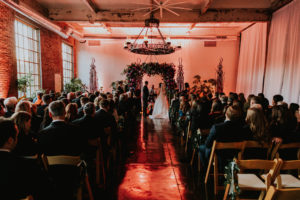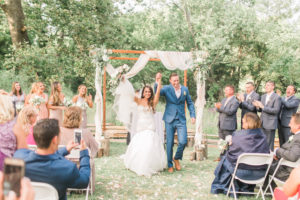
The New York Times reported in February a prediction from the trade group Wedding Report that about 2.5 million weddings would “take place” this year, a “bump not seen since 1984.”
Locally, rabbis and event managers are corroborating the forecast. Weddings are back in 2022, they say.
But aside from the beginning of the pandemic in 2020, the lockdown period, weddings never really went away, according to rabbis and event managers. They just changed shape.
Philadelphia-area Jews held smaller celebrations, sometimes even micro affairs with 10 or 12 people. They also hosted parties in different locations than traditional venues, like backyards and public parks. Some gatherings still crossed the 100-guest threshold but, in general, these major life events were scaled down due to pandemic concerns.
In 2022, though, the standard big party is back, and it’s back in full.
Samantha Foxwell, a coordinator at the Artesano Gallery in Philadelphia, said, “We’re seeing 200-, 250-person weddings.”
Michelle Durinzi, the marketing director for Robert Ryan Catering, which services three area venues, estimated that the average 2022 wedding crowd is between 125 and 175 guests.
Both ranges are larger than the planners saw in 2020 and ’21.
“People are ready to party again,” Durinzi said.
And it’s not just crowd sizes that are standing out — it’s the sheer amount of bookings that venues and caterers are seeing.
According to Foxwell, Artesano Gallery already has 43 events on its 2022 schedule. She mentioned that, “we’ve seen a ton of inquiries for 2023 and 2024.”
Nancy Schwoebel, who runs catering sales for Catering by Design, a company that serves event spaces in Bucks County, on the Main Line and in Philadelphia, said, “people are booking much more short-term than they were.” Between the short-term bookings and rollover reservations from 2021, when many couples postponed weddings, Catering by Design has far more dates in 2022 than a year ago.
“People are very much eager to get married,” Foxwell said.
And in the Jewish tradition, the ceremony is merely part one. The ensuing party with the whole village is close to a necessity in its own right.
Rabbi Aaron Gaber of Congregation Brothers of Israel in Newtown said “people are planning the follow-on affair,” meaning they got married last year and “now they’re going to celebrate.”
“People are still getting married, and people are still having fun,” he added.
Rabbi Nathan Weiner of Congregation Beth Tikvah in Marlton, New Jersey, is noticing the same trend in the COVID era — receptions detached from ceremonies, and receptions that are starting to happen now for those ceremonies.
Such celebrations fulfill the desire to party in full that the rabbi is seeing in general right now. He is set to officiate at two weddings this spring; both will include “cocktail hours, schmoozing, drinking, singing and dancing with over 100 people,” he said.
Jewish spiritual leaders, quite naturally, view this as a beautiful thing.
“You want to perform the mitzvah of rejoicing with a wedding couple,” Weiner said.
“People need joy and a source of resilience,” added Rabbi Ari Lev Fornari of Kol Tzedek in Philadelphia.
“Any couple getting married is a great celebration and represents a new beginning,” Gaber said. “Now that we’re coming into the endemic, people are looking for ways to celebrate together.”
But even as we enter what appears to be the endemic, local Jews are still taking a cautious approach to their weddings.
At the Artesano Gallery, couples still ask event coordinators to “make sure there’s space” for guests to maneuver without getting too close to one another. There are also still “tons of couples who want smaller weddings,” Foxwell said.
Durinzi mentioned similar trends among Robert Ryan clients; over the winter, couples mostly kept their guest lists between 70 and 100 people because their friends and family members were concerned about the virus; and there are still “a fair share” of people who ask for weddings with between 12 and 40 loved ones in attendance, though Robert Ryan doesn’t usually book those.
Schwoebel says Catering by Design’s schedule is a healthy mix of bigger, 2019-style weddings and smaller, more intimate COVID-era affairs. The sales coordinator believes this is not an accident, either, as the smaller, more intimate affairs have benefits beyond safety.
They are more intimate, as well as less expensive and less stressful for the bride and groom.
“They saw it was a good thing,” Schwoebel said. “’Let’s have a smaller wedding. We don’t need hundreds of people.’”
Sometimes, less can be more, according to the sales coordinator. At a smaller affair, the guests of honor can just enjoy their guests. They don’t have to make sure that they see and talk to everyone.

Schwoebel compared the smaller wedding to a dinner party which, for a more introverted couple, may be better than an epic blowout.
“They don’t want to be the center of attention, and they just want to have a little dinner party,” she said.
Plus, after two years of smaller, more intimate celebrations, there’s a whole online history of them for people to reference.
“Now brides can look at that information,” Schwoebel said.
Rabbis say those weddings are as beautiful as the ones involving the whole village.
Rabbi Benjamin David of Adath Emanu-El in Mount Laurel, New Jersey, officiated at several micro-celebrations during the pandemic and called them “a joy.”
“They spoke to love and family and community in this really honest way,” he said. “They stripped away big bands and big flowers, big caterer. It stripped all of that away to the essentials of the bride, the groom, the fact that love will not be denied.” JE






